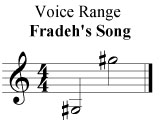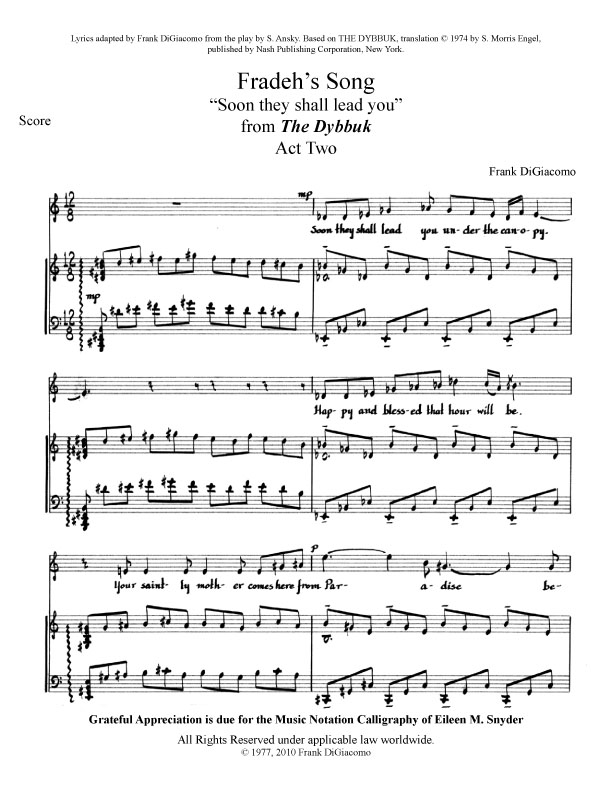Lyrics adapted by Frank DiGiacomo from the play by S. Ansky. Based on THE DYBBUK, translation © 1974 by S. Morris Engel, published by Nash Publishing Corporation, New York.
This aria is sung early in Act Two, by Laia’s grandmother, who, since her own daughter died bearing Laia, has been as a mother to Laia. The rituals and customs preceding Laia’s marriage are somber and exhausting, and Laia is extremely nervous and frightened. Fradeh tries to comfort her in this song, recalling her mother for her on this day of days.
(The greater part of the marriage customs involve such events as visiting the graveyard to invite the souls of the dead relatives to the ceremony, and lamenting before the doors of the bride’s girlhood friends as if she were dead, prior to her rebirth as a married woman. All of this conspires to concentrate Laia’s thoughts on death and the dead, primarily her mother, and Khannon, with whom she has become nearly obsessed since his strange death.)
The recording is of a performance by Jean Loftus, accompanied by the Composer, at the recital An Evening of New Music by Frank DiGiacomo, on May 18, 1977 at the Carrier Theater of the Mulroy Civic Center in Syracuse, New York.

LYRICS
FRADEH:
Soon they shall lead you under the canopy.
Happy and blessed that hour will be.
Your saintly mother comes here from paradise,
bedecked with robes of silver and gold.
Greeting your mother are two angels bright,
and they will take her by the hand,
one on the left and one on the right.
And they shall sing as I do now:
Oh, Khannele mine, oh, Khannele mine,
Oh, why have you come here in robes so fine?
And this is what Khannele said:
“No robes are too fine for this day of days;
my only child, the crown of my head,
this day will to the canopy be led.”
Khannele mine, Khannele mine,
why is your face in pain and sorrow entwined?
And this is what Khannele answers and says:
“What sorrow too great for this day of days,
for my daughter is led by others
to her wedding in pride,
and I must in sorrow stand aside.”
When to the canopy they lead the bride,
young and old will come from every side;
and the Prophet Elijah takes the goblet of wine,
and recites the blessing himself for the wine —
the whole land will echo “Amen”.
Remember your poor mother on this happy day,
my child, my poor daughter, who died before her time.
